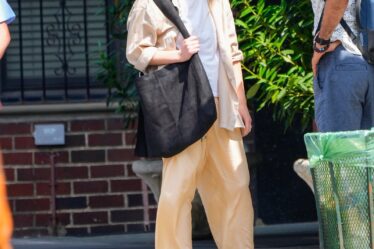
In 1986, Wayne’s life was always busy. He lived in Jamaica Plain, Boston, and worked as an administrative assistant for a legal office, as well as volunteering on a housing project. “I was helping to stop evictions, challenge rent increases, fight for rent controls and support residents,” he says.
When he started to have sinus problems, he booked an appointment at a local health centre to get tested for allergies. “They gave me a scratch test, but I didn’t have any reaction. It turned out I had sinusitis and it was nothing to do with allergies.” On the way out, he spotted Aura in the waiting room. Although they volunteered for the same housing projects and had seen each other around, they had never really spoken. “She’d had the same allergy tests as me and was all swollen up,” he says. “I said, ‘You look terrible!’ – because of all the swelling, which I now realise wasn’t the smartest thing to say.” Luckily, Aura wasn’t offended. “I’m really laid-back and not easily insulted,” she says, laughing.
The pair struck up a conversation. “I thought she was beautiful and nothing like anyone else I knew,” he says. “I came from a very white background in the suburbs and didn’t meet anyone from different backgrounds until my teenage years. I was interested in getting to know her, so I asked her out for dinner.”
Aura, who is originally from Honduras, thought Wayne seemed “smart and handsome”. “I’d been living in Jamaica Plain, which has a big Latino population, since I was 14, but my English wasn’t that good at the time,” she says. “I was happy to go out with him as we had friends in common who I really like and respect, so I thought he was probably nice too.”
They went out for dinner and felt “a natural connection”. “I found her interesting, and we shared political interests, as well as liking the same music and art,” says Wayne. “We discovered neither of us were interested in having children either, which was uncommon at that point.” Aura enjoyed Wayne’s jokes and sense of humour, though admits she “didn’t understand everything he said”.
They quickly became a couple and, by 1988, had moved in together. While they continued to volunteer for the housing community, Wayne built a career working for a union. Aura, who had been working in legal services when they met, became an interpreter at a hospital and then an interpreter and translator for Harvard legal services.
At weekends, they went to plays and gigs, as well as taking trips to Cape Cod and the nearby beaches. At the time, interracial couples were unusual, and Wayne says racism was rife in Boston. “Luckily, where we lived was quite diverse compared with other areas of the city,” he says.
Although they had never planned to get married, Wayne proposed on Nantucket Island in Cape Cod, 10 years after they moved in together. “I wasn’t sure he was really serious as we’d never considered it before,” says Aura. Although she knew she wanted to grow old with Wayne, they had never been a “conventional” couple. “By that point, though, I felt that feminism had come a long way and marriage was changing,” she says. For the first time, they say, it felt right for them. “We knew we needed to take care of each other. If you want benefits, society pushes you to conform. Eventually, most of our friends did the same thing,” says Wayne.
Aura loves how open-minded, sensitive and perceptive her partner is. “He has a way of seeing everyone as an equal. He doesn’t judge and always takes people for who they are,” she says. “I’ve had problems with my health over the years, but Wayne always looks after me. He’s so nurturing; that’s an aspect that people don’t always see.”
Wayne appreciates that Aura is “very much her own person” and never apologetic about being herself. “She’s truly unique and that’s a big attraction for me. I am not always the easiest person to get along with, so anyone who can tolerate me for 40 years has got something special. I feel lucky that we’ve stayed together all this time and feel that we’ve grown through being with each other.”



